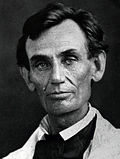
Abraham Lincoln (February 12, 1809 – April 15, 1865) was the 16th President of the United States, serving from March 1861 until his assassination in April 1865. Lincoln led the United States through its Civil War—its bloodiest war and its greatest moral, constitutional and political crisis. In doing so, he preserved the Union, abolished slavery, strengthened the federal government, and modernized the economy.
Born in Hodgenville, Kentucky, Lincoln grew up on the western frontier in Kentucky and Indiana. Largely self-educated, he became a lawyer in Illinois and a member of the Illinois House of Representatives, where he served from 1834 to 1846. Reentering politics in 1854, he became a leader in building the new Republican Party. In 1858, while taking part in a series of highly publicized debates with his opponent and rival, Democrat Stephen A. Douglas, Lincoln spoke out against the expansion of slavery but lost the U.S. Senate race to Douglas.
Lincoln was elected president in 1860. His election prompted seven southern slave states to form the Confederate States of America before he was sworn into office. Lincoln's complex moves toward ending slavery centered on the Emancipation Proclamation of 1863. He closely supervised the war effort, especially the selection of top generals, and made major decisions on Union war strategy. His Gettysburg Address of 1863 became an iconic endorsement of the principles of nationalism, republicanism, equal rights, liberty, and democracy. Six days after the surrender of Confederate commanding general Robert E. Lee, Lincoln was assassinated by John Wilkes Booth, a Confederate sympathizer. Lincoln has been consistently ranked both by scholars as one of the three greatest U.S. presidents. (Read more...)